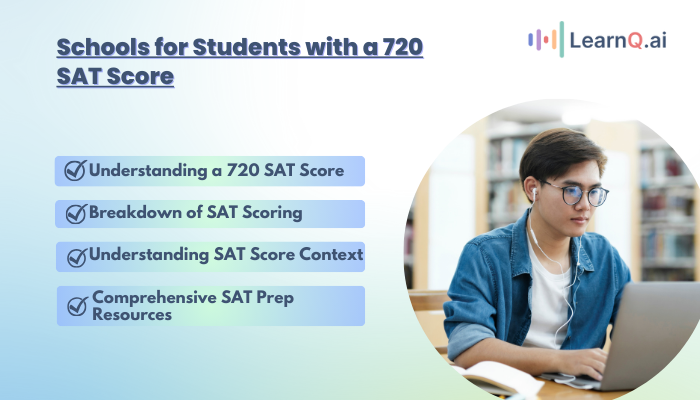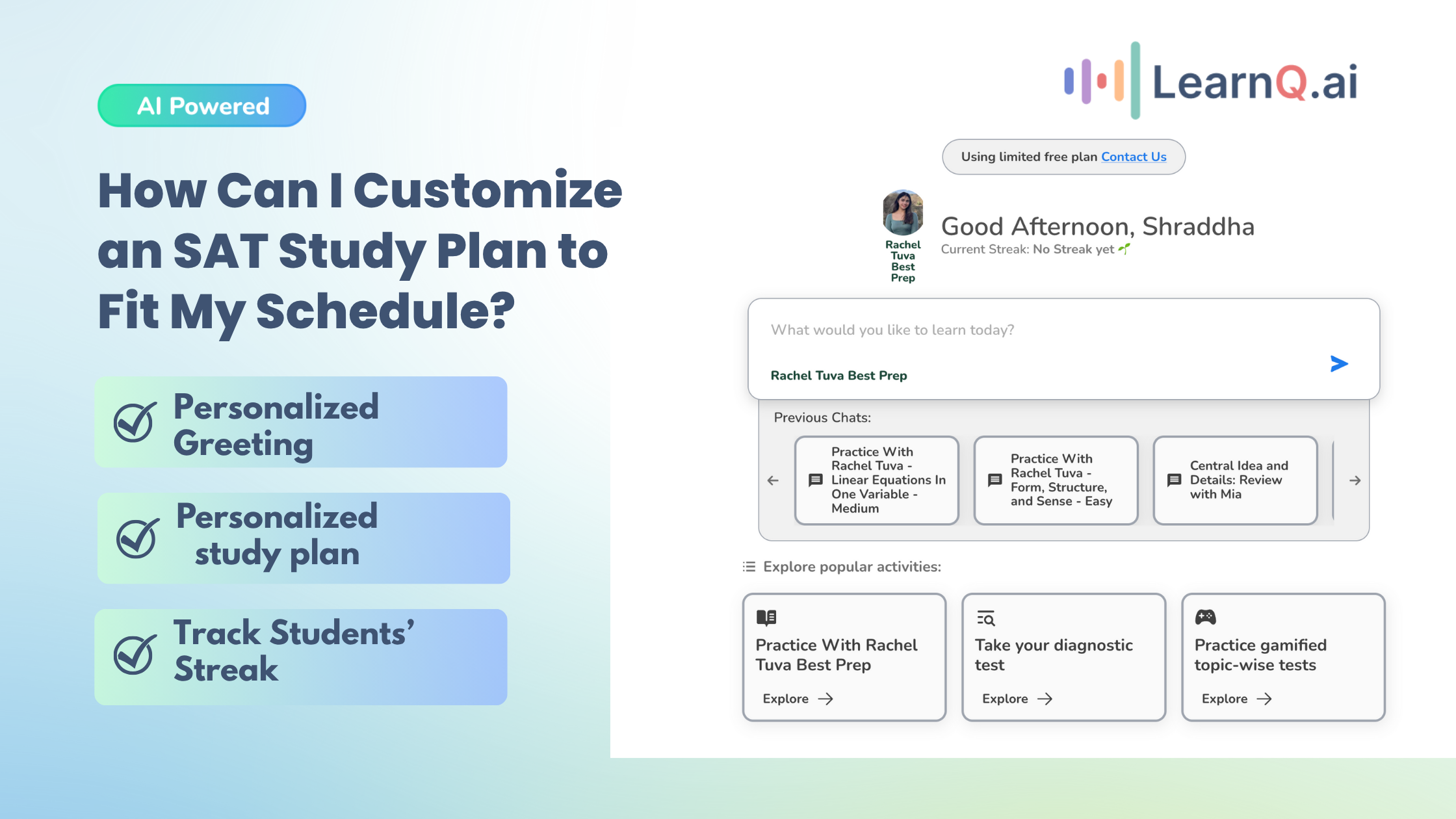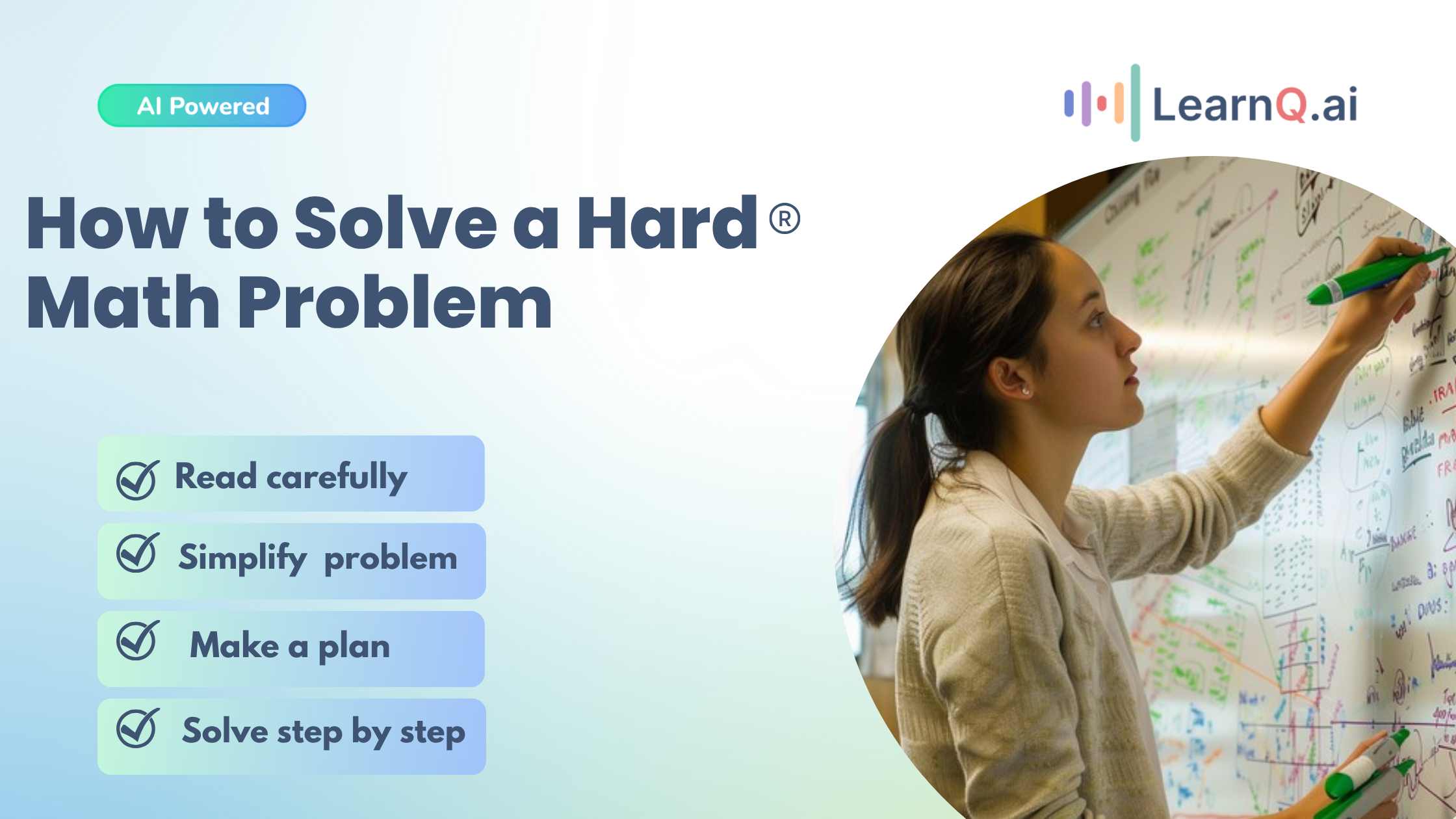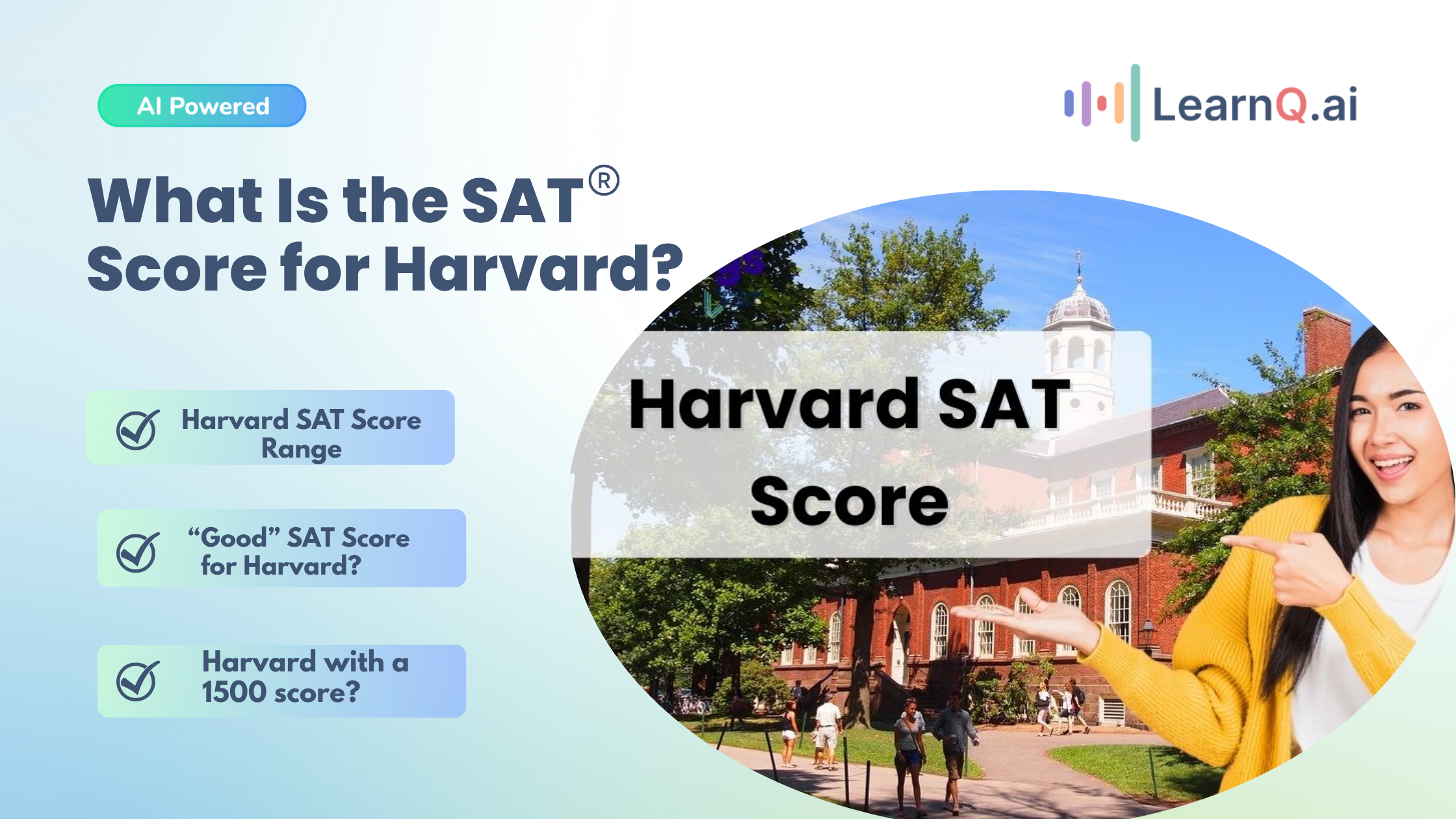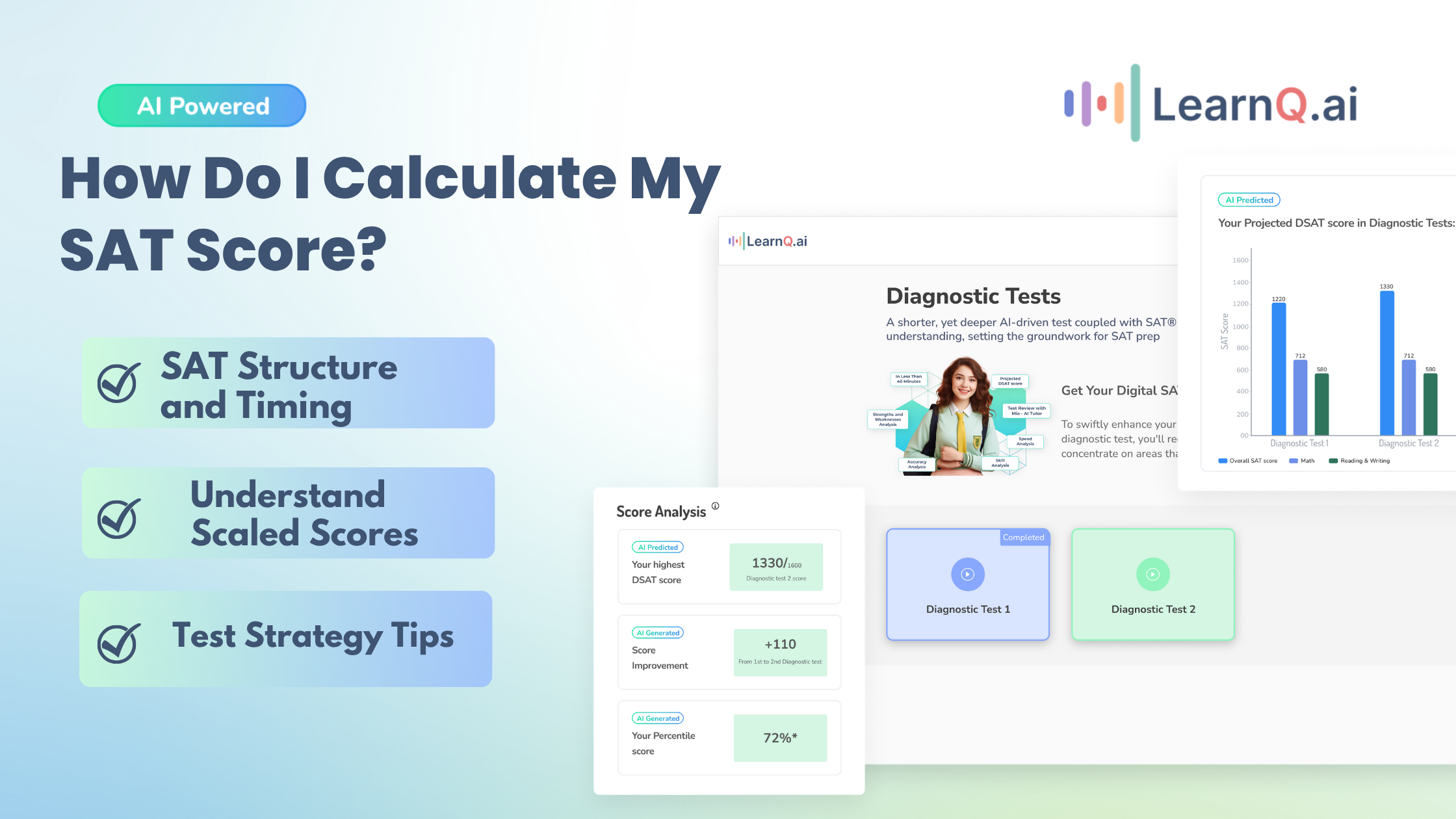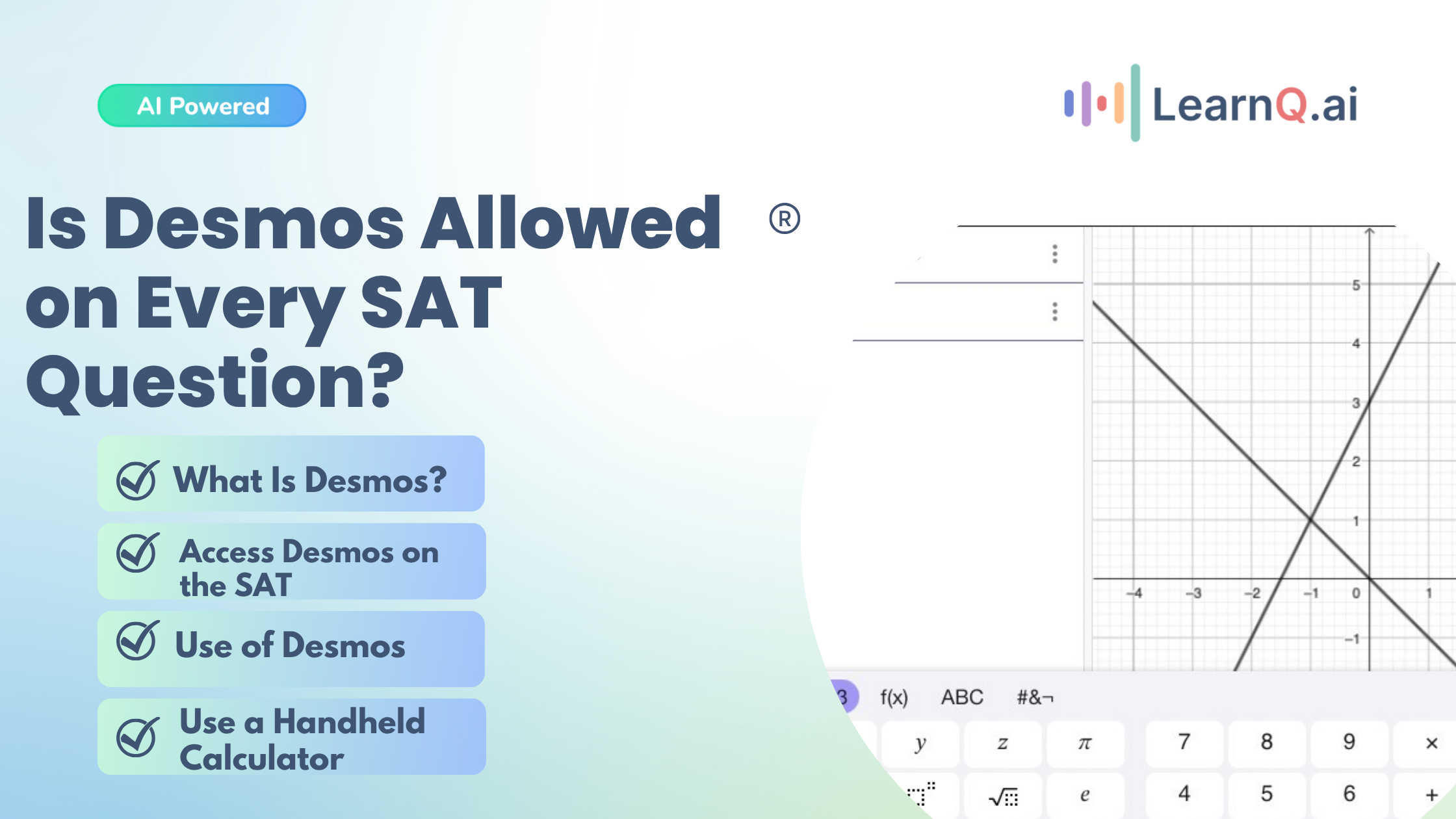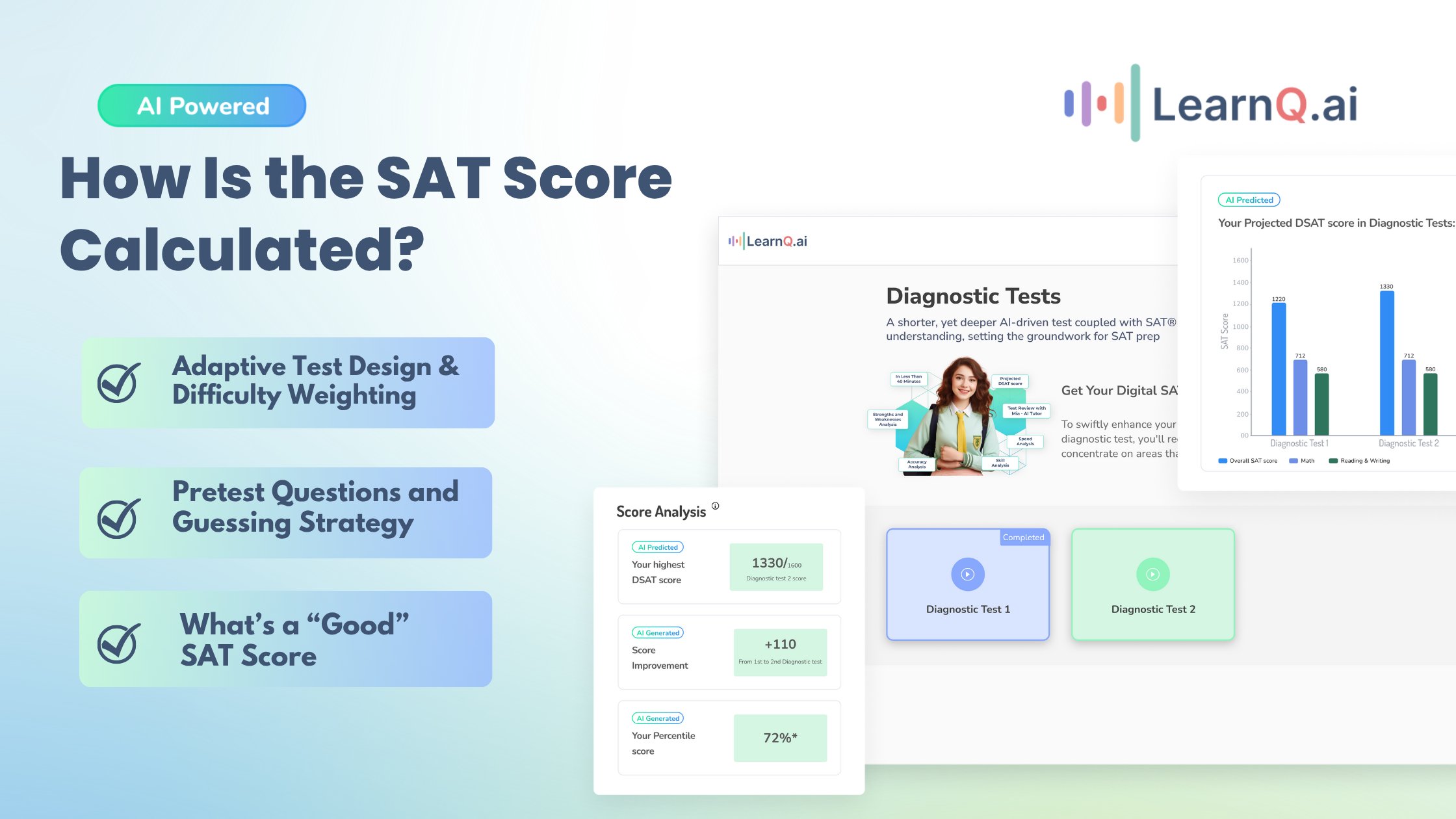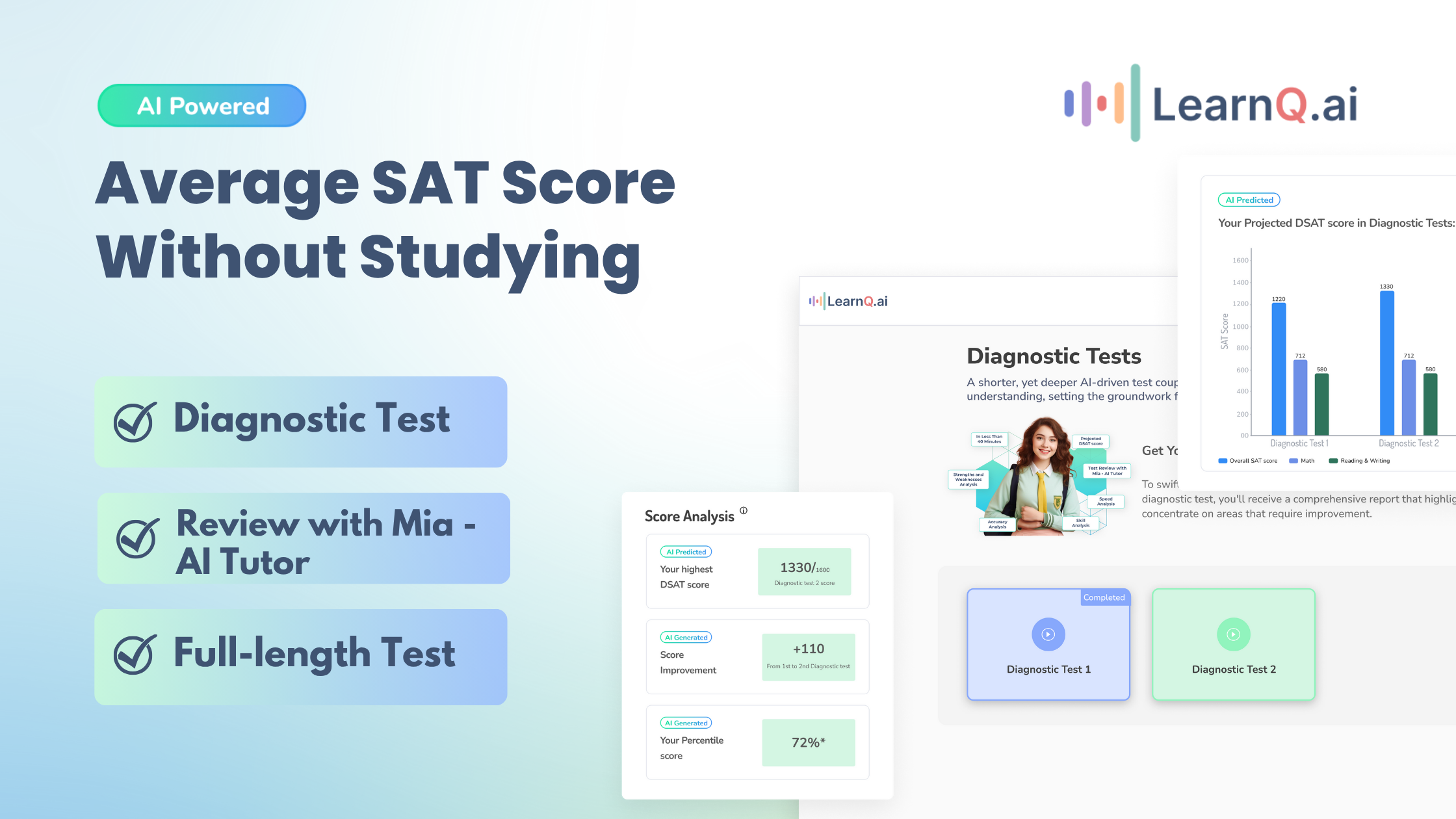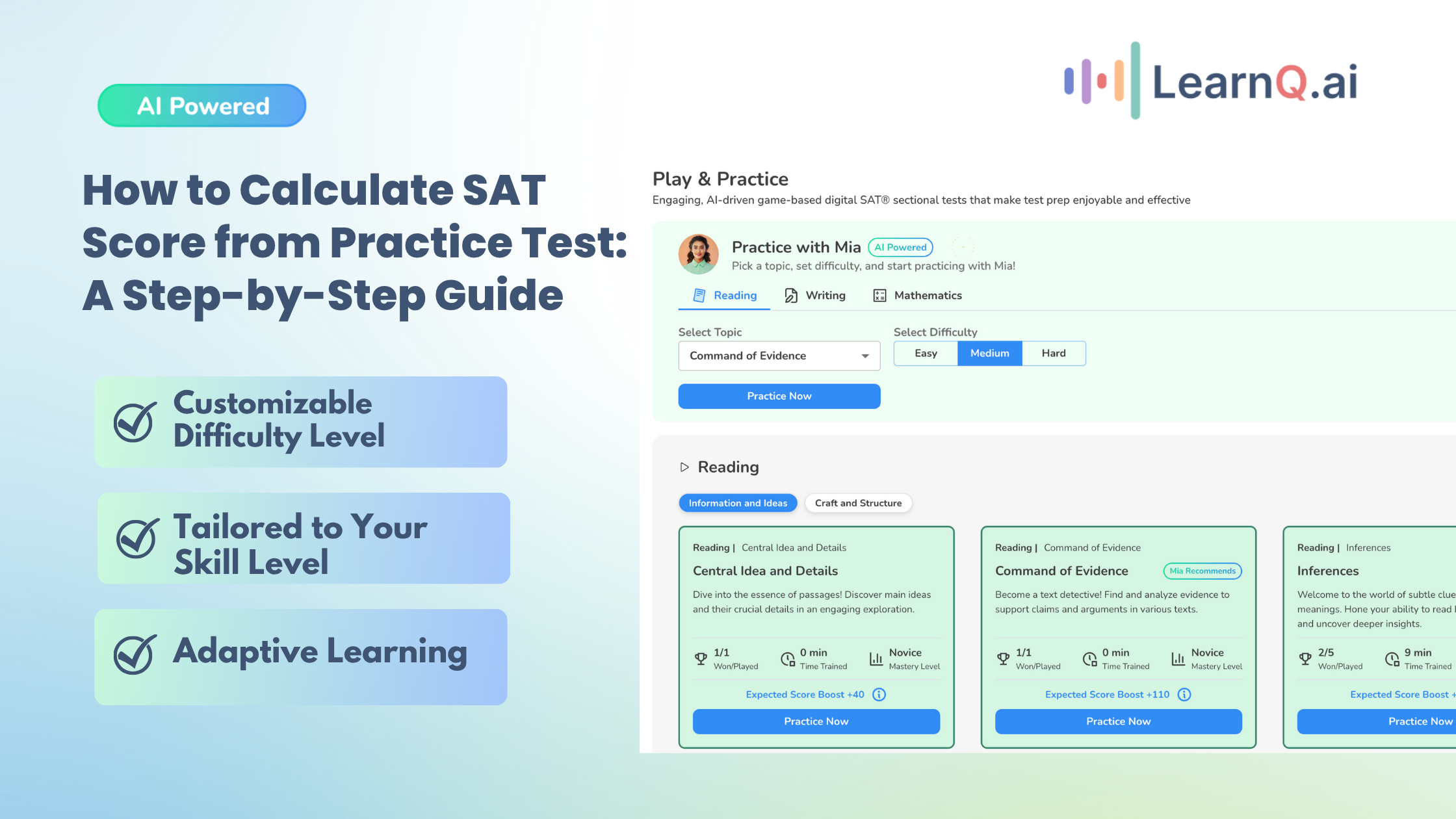Ever wonder if the SAT stands for “Somewhat Agonizing Test”? Let’s dive in and see how a score of 720 plays out in the college arena.
The Scholastic Assessment Test (SAT) is a standardized test that assesses students for college admissions in the United States. Colleges use it to evaluate applicants from different schools and backgrounds to measure their capability and suitability for admission.
The College Boards administer the SAT, which high school students generally take during their junior or senior year. The test comprises multiple-choice questions and an optional essay section. It analyses a student’s academic abilities and readiness for college by measuring their knowledge and skills in reading, writing, and math.
LearnQ.ai is Powered by VEGA AI—Is your Institute Next?
Give students a Duolingo-style test-prep platform with Shopify-level customization for tutors and institutes.
The SAT score is measured on a scale of 400 to 1600, with 1600 being the highest possible score.
While a 720 might not place a student among the top scorers, it certainly does not mean the door has closed on you for educational opportunities.
To understand the implications of a 720 SAT score, let’s first discover the different college options available. Then, let’s see how to enhance both readiness and competitiveness in the admissions process.
Overview of the SAT and Its Role in College Admissions
The SAT comprises three main parts: Evidence-Based Reading and Writing (EBRW), Math, and an optional Essay section. Each section has a score of 200 to 800, making the total possible score range from 400 to 1600. We will look into it in more detail later in this blog.
Understanding a 720 SAT Score
A 720 SAT score means a student is below the national average. If you have scored 720, it means that though you have some foundational skills, there is significant room for growth in terms of college readiness.
Regarding standardized test percentiles, a score of 720 usually places a student around the 25th to 30th percentile nationally. Simply put, a 720 score means approximately 2,050,000 of the 2 million test takers scored the same or higher than you. On the other hand, you scored more than 1.8 million test takers.
So, with such seemingly impressive numbers, why is a 720 SAT score still perceived as bad? This is because millions of students apply to colleges and universities nationwide, but the available seats are limited.
Colleges, especially the best ones in the country, must be highly selective about the type of students they accept. Anybody can apply, so just because you outperformed the majority of the students who took the test, it doesn’t mean you are entitled to get accepted into your dream school.
While a 720 SAT score may seem decent compared to most test-takers, it’s important to recognize that it may still be inadequate to the benchmarks set by competitive colleges. This is where understanding the broader context of SAT scores becomes crucial.
Enhance your Digital SAT study routine with AI-driven insights and personalized practice tests.
Understanding SAT Score Context
Understanding the context of the SAT score is just the beginning. To fully grasp the implications of a score like 720, you have to understand how SAT scores are calculated and broken down across different sections. You have to also know about college admission requirements.
Breakdown of SAT Scoring
Understanding the SAT scoring system is crucial to comprehend the significance of a 720 SAT score.
- Evidence-Based Reading and Writing (EBRW): It assesses the reading comprehension, analysis, and writing skills of students. EBRW is broken down into Reading and Writing & Language sub-sections, each scored from 200 to 800.
- Math: This section tests a student’s ability to solve problems and understand concepts across various mathematical topics, including algebra, problem-solving, and data analysis.
A score of 720 may reflect strengths in one section and weaknesses in another. For example, a student might excel in math but struggle with reading comprehension, which impacts their overall score. Therefore, a SAT score analysis can be insightful for areas that require improvement.
College Admissions Requirements
College admission is highly competitive, with many institutions considering multiple factors beyond SAT scores. For a student with a 720 SAT score, it’s essential to consider the holistic approach many colleges adopt in their admissions processes.
Colleges often look at the following:
- High School GPA: A strong GPA can significantly enhance an application, indicating a student’s academic performance over time.
- Extracurricular Activities: Involvement in clubs, sports, or community service showcases a student’s interests and dedication outside the classroom.
- Personal Statements and Essays: These allow students to share their unique experiences, motivations, and aspirations, strongly backing their academic performance.
- Letters of Recommendation: Strong endorsements from teachers or mentors can also play a pivotal part in admissions decisions.
For students with lower SAT scores, excelling in these other areas can make their applications more competitive. In addition, you should remember that there are schools where the admission requirement is 720 SAT score.
Also Read: What is the Highest Score on ACT and SAT Tests?
Schools Suitable for Students with a 720 SAT Score
Let’s take a look at these institutions, which include community colleges, regional public universities, liberal arts colleges, and online colleges and universities.
Community Colleges
Community colleges are a practical option for students with a 720 SAT score. They offer several advantages, like the following:
- Open Admissions Policies: Many community colleges have open admissions policies, allowing students to enter without strict SAT score requirements. After completing an associate degree, students can often transfer to a four-year institution.
- Affordable Tuition: Community colleges generally charge lower tuition rates than four-year institutions, making them an economical choice.
- Transfer Opportunities: Students can transfer to four-year universities after completing an associate degree. Many community colleges have established partnerships with local universities, facilitating a smooth transition.
Moreover, community colleges often offer strong support services, including academic advising, tutoring, and career counseling, to help students succeed.
Examples of community colleges include:
- Santa Monica College
- Miami Dade College
- Northern Virginia Community College
Regional Public Universities
Regional public universities are another excellent option for students with a 720 SAT score. These institutions often prioritize access and inclusivity, allowing a broader range of students to pursue higher education. These institutions usually have more flexible admissions standards. Some key features include:
- Less Competitive Admissions: Regional public universities typically have lower SAT score requirements than flagship state universities. This means that a 720 SAT score is sufficient for admission.
- Diverse Programs: Many regional universities offer programs catering to various interests and career paths.
- Supportive Campus Environment: These universities often focus on creating supportive learning environments, including resources like tutoring centers and mentoring programs.
Examples of regional public universities that might accept students with a 720 SAT score include:
- University of North Texas
- Southeast Missouri State University
- University of Southern Indiana
- Eastern Kentucky University
- Kent State University
- Wichita State University
Liberal Arts Colleges
Liberal arts colleges offer a unique educational experience with small class sizes and a strong focus on undergraduate education. For students with a 720 SAT score, these institutions can provide a supportive ambiance that values personal qualities and experiences alongside academic performance.
- Holistic Admissions: Many liberal arts colleges adopt holistic admissions processes, considering a student’s various qualities and capabilities, not just test scores. This can benefit students who demonstrate potential through their essays, recommendations, and extracurricular involvement.
- Focus on Personal Growth: Liberal arts colleges focus on developing critical thinking, communication skills, and intellectual curiosity. This approach can be particularly beneficial for students who may need to perform better on standardized tests but excel in other areas.
Some liberal arts colleges that consider applications from students with a 720 SAT score include:
- Hampden-Sydney College
- Allegheny College
- Earlham College
- Goucher College
- Hollins University
- Beloit College
Online Colleges and Universities
Online education has transformed the college landscape, making higher education more accessible to students with varying SAT scores. Online colleges offer flexibility that can be especially appealing for non-traditional students or those balancing multiple commitments.
- Flexible Learning: Online programs often allow students to learn at their own pace, making it easier to juggle work, family, and studies.
- Accredited Programs: Many reputable institutions offer fully accredited online degrees, ensuring that the education received is high quality and recognized by employers.
Examples of well-regarded online institutions include:
- Southern New Hampshire University
- Purdue University Global
- Liberty University Online
These schools often offer various support services, such as online tutoring and career counseling, to assist students in their academic journeys.
While a 720 SAT score may limit options at highly selective institutions, there are still plenty of schools where this score can be competitive. However, it’s important to remember that SAT scores are just one part of the equation when selecting a college, and there are many other factors involved.
Factors Influencing College Choices Beyond SAT Scores
While standardized testing is a significant part of the college admissions process, it is not the only factor that schools consider. Several other elements can influence college choices for students with a 720 SAT score.
High School GPA and Coursework
High school GPA remains one of the most critical factors in college admissions. It is often considered a more reliable indicator of a student’s readiness for college than standardized test scores.
- Importance of GPA: A high GPA can significantly strengthen an application, particularly in challenging courses such as AP or IB. Colleges appreciate students who challenge themselves academically and demonstrate consistent performance.
- Course Rigor: Students should take rigorous courses throughout their high school years, as this can enhance their overall profile. Colleges want to see that students have engaged with challenging material, even if their SAT scores may not reflect their full potential.
Extracurricular Activities and Leadership Roles
Extracurricular involvement can significantly enhance a student’s college application, showcasing their interests, leadership skills, and commitment to their communities.
- Clubs and Organizations: Participation in clubs related to academic interests or hobbies can help students develop valuable skills and make connections.
- Community Service: Volunteering demonstrates a commitment to the community and can be particularly impactful in making personal statements.
- Leadership Positions: Taking on leadership roles, whether in clubs, sports teams, or community projects, can set a student apart from other applicants.
Additionally, letters of recommendation highlighting a student’s character, work ethic, and potential can further bolster an application.
Financial Considerations
Financial factors play a significant role in college choices, especially for students with a 720 SAT score.
- Financial Aid: Many colleges offer financial aid packages that can reduce the cost of tuition. You should explore federal and state financial aid options, including grants, loans, and work-study programs.
- Scholarship Opportunities: Some institutions offer merit-based scholarships for students with lower SAT scores. Try researching and applying for these scholarships to help make college more affordable.
- Cost of Attendance: When evaluating college options, you should consider the overall cost of attendance, including tuition, fees, housing, and living expenses. Some schools may offer substantial financial aid, making them more affordable even if you have lower SAT scores.
With this broader perspective in mind, the next step is to explore how students can leverage available resources to not only strengthen their application but also improve in areas where they may feel they are lacking.
Leveraging Resources for Improvement
Even with a 720 SAT score, there is always room for growth and improvement. You should consider various resources to enhance your academic performance and test scores.
Utilizing SAT Prep Tools
Utilizing SAT prep tools can be invaluable for students aiming to improve their SAT scores. Continuous preparation can lead to significant score increases, ultimately opening doors to more selective institutions.
- Study Programs: Online platforms like LearnQ.ai offer tailored study plans, practice tools, and personalized progress tracking to help students enhance their test-taking skills.
- Practice Tests: Taking full-length SAT practice tests can help students become familiar with the test format and timing, reducing anxiety on test day.
- Targeted Practice: Focusing on specific areas of weakness, whether in Math or EBRW, can lead to more efficient studying and better outcomes.
Setting Goals for College Readiness
Creating an academic plan that includes SAT preparation alongside regular studies is essential for students looking to boost their college readiness.
- Customized Study Plans: Developing a personalized study plan can help students set realistic goals for improving their SAT scores and academic performance. This approach allows students to focus on their unique needs and strengths.
- Progress Tracking: Utilizing tools that allow for progress tracking can help students stay motivated and accountable in their studies. Monitoring improvements over time can provide a sense of achievement and encourage continued effort.
To make significant strides in SAT preparation, utilizing the right resources effectively is crucial. However, the true advantage comes from having a system, like an AI-powered tool, that adapts to your individual learning style and needs. LearnQ.AI harnesses the power of artificial intelligence to provide a dynamic approach to SAT prep.
Benefits of LearnQ.AI for Teachers To Help Students Score High in SAT
LearnQ.ai’s personalized learning plans, real-time feedback, and data-driven insights for teachers create an environment where students can continuously improve. Here’s how LearnQ.ai will help training institutes support the academic journey of students and improve their chances for college admissions:
Personalized Learning Experience
Tailored Study Plans: LearnQ offers personalized study plans based on a student’s unique strengths and weaknesses. For example, a student with a 720 SAT score can focus specifically on the areas where they need improvement, whether in Evidence-Based Reading and Writing (EBRW) or Math.
Adaptive Learning Technology: This AI platform uses adaptive algorithms to adjust the difficulty of SAT practice tests based on student performance. This ensures learners are consistently challenged appropriately, helping them build confidence and skills.
Comprehensive SAT Prep Resources
Targeted Practice Questions: LearnQ.ai provides access to a vast library of practice questions aligned with the SAT format. Students can engage with these resources to become more familiar with the types of questions they’ll encounter on test day, which is crucial for improving their scores.
Mock Tests and Analytics: Taking full-length, timed practice tests simulates the actual testing environment. LearnQ.ai analyzes performance on these tests, offering insights into specific areas that need attention. This helps students track their progress and adjust their study strategies accordingly.
Enhance your Digital SAT study routine with AI-driven insights and personalized practice tests.
Interactive Learning Tools
Engaging Content: The platform includes interactive lessons that make learning more engaging. For students who may struggle with traditional study methods, this interactive approach can help maintain motivation and interest in the material.
Gamification Elements: Incorporating gamification can enhance learning by making it more fun and rewarding. Features like quizzes, achievements, and leaderboards can encourage students to stay committed to their study goals.
Continuous Progress Monitoring
Real-Time Feedback: As students work through practice questions and tests, LearnQ.ai offers immediate feedback. This allows students to learn from their mistakes and make adjustments in real-time, reinforcing their understanding of the material.
Progress Tracking Features: Students can monitor their improvement over time, which is vital for maintaining motivation. Understanding how much they have improved can boost their confidence and commitment to their studies.
Also Read: Comparing Difficulty: Real SAT vs Practice Tests
LearnQ.ai is powered by VEGA AI—Is your institute next?
Offer students a Duolingo-style test-prep platform with Shopify-level customization for tutors and institutes.






Conclusion
A 720 SAT score cannot define your potential or future success. While it may present challenges in the competitive college admissions landscape, numerous opportunities exist for students to pursue higher education.
You can make informed decisions that align with your goals by understanding the context of their SAT scores and exploring suitable institutions. Moreover, leveraging available resources for improvement can enhance your college readiness and academic profile.
Explore various college options, take proactive steps to strengthen applications, and consider how to improve your SAT scores.
Tools like LearnQ.ai will provide valuable resources to support your academic journeys, ensuring you have the guidance and assistance needed to reach your full potential. It helps you focus on areas where you can improve and raise your score efficiently.
Whether a student wants to boost their math score or perfect their reading comprehension, LearnQ.AI offers real-time feedback and adaptive digital SAT prep that align with each unique learning style. See how this platform helps teachers guide students to get SAT Score 1500+. Discover and utilize the benefits now!

